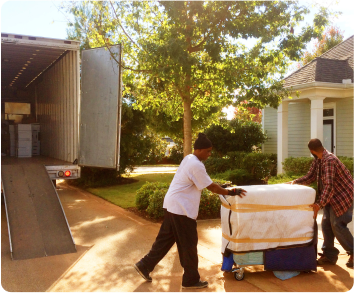How To Compare Moving Companies Quotes: Complete Guide
Are you planning a move and overwhelmed by all the quotes from different moving companies? Figuring out which quote is the best can feel confusing, especially when every company offers something a little different. But comparing moving company quotes doesn’t have to be difficult.
By understanding what to look for and how to analyze the details, you can find the best company for your move without breaking the bank. Let’s walk through the step-by-step process of comparing moving company quotes, so you can make the right decision for your next move.
Why Comparing Moving Quotes is Crucial?

Comparing moving quotes is essential for several reasons:
-
Save Money
Different companies offer varying prices for similar services, and comparing helps you find the best deal. -
Identify Hidden Fees
Some quotes may have hidden costs that can significantly increase the final price. Comparison helps you spot these extra fees. -
Evaluate Service Options
Not all companies provide the same services. Comparing quotes allows you to see which services are included and choose what fits your needs -
Ensure Quality and Reliability
Researching multiple companies helps you find a reputable mover, reducing the risk of damage to your belongings -
Understand Insurance Coverage
Companies offer different levels of insurance. Comparing ensures you choose the right coverage for your valuable items
Overall, taking the time to compare moving quotes helps you make an informed choice, save money, and ensure a smoother moving experience.
Step by step guide to Compare Moving Company Quotes
-
Start with Getting Multiple Quotes
The first and most important step is to collect quotes from at least three different moving companies. This gives you a range of options to compare and ensures you’re not missing out on better deals. When requesting quotes, make sure you're clear about the details of your move, such as:
-
The size of your home
-
Distance of the move (local or long-distance)
-
Special items like pianos, antiques, or fragile belongings
-
Any additional services (packing, storage, etc.)
-
Having clear information helps companies give you accurate estimates, making it easier for you to compare them later.
-
Look at the Type of Estimate
There are generally three types of estimates you’ll receive:
-
Non-binding estimate
This is the company’s best guess of how much the move will cost. The final price can be higher or lower than the quote, depending on the actual weight of your items or additional services used.
-
Binding estimate
This is a firm price that won’t change, as long as nothing about the move changes (like adding more items). Even if the move takes longer or weighs more, the price stays the same.
-
Binding not-to-exceed estimate
This is the best option for many movers. If your move weighs less than expected, you pay less. But if it’s more than expected, the price won’t go higher than the estimate.
-
Always check which type of estimate you’re being offered. A non-binding estimate might seem cheaper upfront, but you could end up paying much more on the moving day if things change.
-
Review What’s Included in the Price
Moving companies often include different services in their quotes, so it’s important to break down what’s included. Some key items to check for:
-
Labor costs
Are the costs for the movers' labor included in the quote? If so, for how many hours?
-
Packing materials
Does the quote include the cost of packing materials like boxes, tape, and bubble wrap?
-
Packing services
Will the company help you pack, or is it just for transportation? Packing services are often extra, so be sure you know if they’re included or not.
-
Transportation fees
Is the fuel cost included in the estimate? Some companies might add fuel surcharges on top of their quote.
-
Insurance
Does the quote include basic liability coverage, or will you need to purchase additional moving insurance?
-
Having a detailed breakdown will help you understand what each company is offering. A cheaper quote might not be the best if it doesn’t include services you need.
-
Pay Attention to Additional Fees

Many moving companies have additional fees that may not be immediately clear. These can make a big difference in the final price, so be sure to ask about them upfront. Some examples of additional fees include:
-
Stair fees
If your move involves a lot of stairs, some companies charge extra for the effort.
-
Long carry fees
If the movers have to carry your items a long distance from your home to the truck, you might face a long-carry fee.
-
Elevator fees
Moving into or out of a building with an elevator? Some companies add a fee for this.
-
Overtime fees
If your move takes longer than expected, overtime charges might apply. Ask about the company’s overtime policy to avoid surprises.
-
Always ask the company about potential extra costs to make sure you're not hit with hidden fees.
-
Check the Company’s Reputation
Price isn’t the only factor you should consider when comparing moving quotes. A company’s reputation is just as important. Check online reviews, social media, and any complaints with consumer protection agencies. Pay attention to reviews that mention how well the company handles your belongings, their punctuality, and whether they stuck to the original quote.
Reputable moving companies will also provide references upon request, so don’t hesitate to ask for them.
-
Consider the Moving Insurance
Most moving companies offer basic liability insurance, which covers a small amount of the value of your belongings. However, if you have valuable or fragile items, this basic insurance might not be enough. Ask each company about their insurance options, and consider purchasing full-value protection if needed.
When comparing quotes, make sure you understand what kind of coverage is included. In some cases, companies may offer more insurance coverage in their base price, which can make their quote seem higher. But if another company doesn’t offer any insurance, you’ll need to add that cost to your total.
-
Look for Flexibility in the Service
If your moving date isn’t set in stone or you need additional services, look for companies that offer flexibility. Some moving companies may give discounts for moves during off-peak times (weekdays or winter months). If you're flexible, you might be able to save money on your quote.
Also, if you need extra services like temporary storage, see if the company can offer a bundle deal. Some companies have packages that include services like packing, storage, and cleaning at a lower price than buying them separately.
Some Questions You May Need To Ask
Don’t be afraid to reach out to each moving company with any questions or concerns you have. Ask about specific terms, especially if something isn’t clear in the quote. For example:
-
What happens if the move takes longer than expected?
-
Are there any fees that aren’t listed on the quote?
-
What is the process if items are damaged during the move?
Clear communication can help avoid misunderstandings and ensure you know exactly what you're paying for.
How to Handle Long-Distance Moving?
Long distance moving company quotes can be more complex than local moves. There are other important factors to consider, such as additional fees that may apply to long-distance moves, including tolls, overnight stays, or special handling for large items.
When comparing long distance moving company quotes, consider the type of insurance offered, the method of transport (such as dedicated trucks or shared loads), and whether the company can accommodate your timeline for delivery.
At the end, choosing the right moving company is about finding the best balance between price, value, and trust. Take your time to review each quote thoroughly, and you’ll be well on your way to a smooth and successful move!



